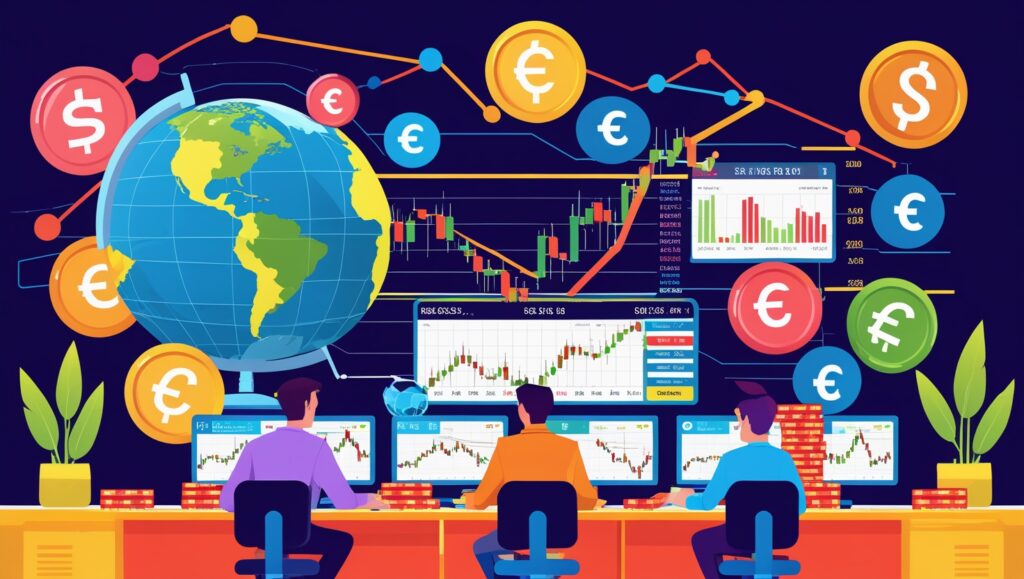What is Forex Trading? A Beginner-Friendly Explanation

Welcome to the world of Forex trading! Let me take you on a simple journey to understand what Forex is, how it works, and why people trade it. Imagine we’re sitting together, and I’m explaining this to you in the easiest way possible. Ready? Let’s dive in!
Introduction to Forex
Forex, short for foreign exchange, is like a giant global marketplace where people exchange money from one country for another. Think about when you travel to another country and swap your money for their currency. That’s Forex! But here, it happens on a much bigger scale with banks, companies, and traders all over the world.
Let’s look at some examples:
- Banks: Big banks like HSBC or JPMorgan trade huge amounts of money daily. They buy and sell currencies to help businesses, manage their reserves, or even make profits from price changes. For example, a bank might exchange millions of euros for dollars when the euro is weak, hoping to sell those dollars later at a higher price.
- Companies: Imagine a car company in Japan that buys parts from the USA. They need to pay in US dollars, so they exchange Japanese yen for dollars. Similarly, companies earning in multiple currencies exchange their profits to manage their money efficiently.
- Traders (Individuals): People trade Forex from their computers. Let’s say a trader predicts the euro will rise against the dollar. They buy euros at a low price. If their prediction is correct and the euro’s value goes up, they sell it back for dollars and keep the profit.
The Forex market can be highly profitable because currencies often fluctuate due to news, politics, or economic events. For example:
- Profit Example: If you buy 1,000 euros when 1 euro equals $1.10 and sell them when 1 euro equals $1.20, you earn $100.
- Loss Example: If the euro’s value drops instead, you could lose money when selling.
History of Forex
Did you know that Forex trading has been around for a long time? It started when people used gold and silver to trade goods. Later, countries began using their own money, and the Forex market was born. In 1971, when currencies started floating (changing value daily), the modern Forex market we know today began.
Forex trading is risky because prices can change quickly. A trader might lose money if they don’t predict the market correctly. However, because of the high volatility, there’s also potential for big profits if you understand the market well and make smart decisions.
Why Do We Trade Forex?
Now, you might wonder, why do people trade Forex? Well, here are a few reasons:
- Make Money: People try to profit by buying a currency at a low price and selling it at a higher price.
- Travel: Travelers exchange money to use in another country.
- Businesses: Companies trade currencies to pay for goods or services from other countries.
Who Trades Forex? (Market Participants)
Let’s look at the main players in the Forex market:
- Big Banks: They handle huge currency trades every day.
- Companies: Businesses trade money to buy or sell products internationally.
- Governments: They manage their country’s money and economy.
- Traders: People like you and me who trade to earn profits.
What Is Traded in Forex?
In Forex, you trade currency pairs, like USD/EUR (US Dollar vs. Euro). The first currency is called the base currency, and the second is the quote currency. You’re essentially betting on whether the base currency will go up or down in value compared to the quote currency.
Advantages and Disadvantages of Forex
Advantages:
- Open 24/5: Trade anytime from Monday to Friday.
- High Liquidity: It’s easy to buy and sell currencies.
- Open 24/5: Trade anytime from Monday to Friday.
- Low Costs: Starting Forex trading doesn’t require huge investments.
Disadvantages
- Risky: Prices can change quickly, leading to losses.
- Complex: It takes time to learn and master.
- Emotional Decisions: Fear and greed can affect your trading.
Forex trading is exciting, and anyone can learn it! But remember, it’s not just about making money. It’s about understanding the market, practicing patience, and being disciplined.
